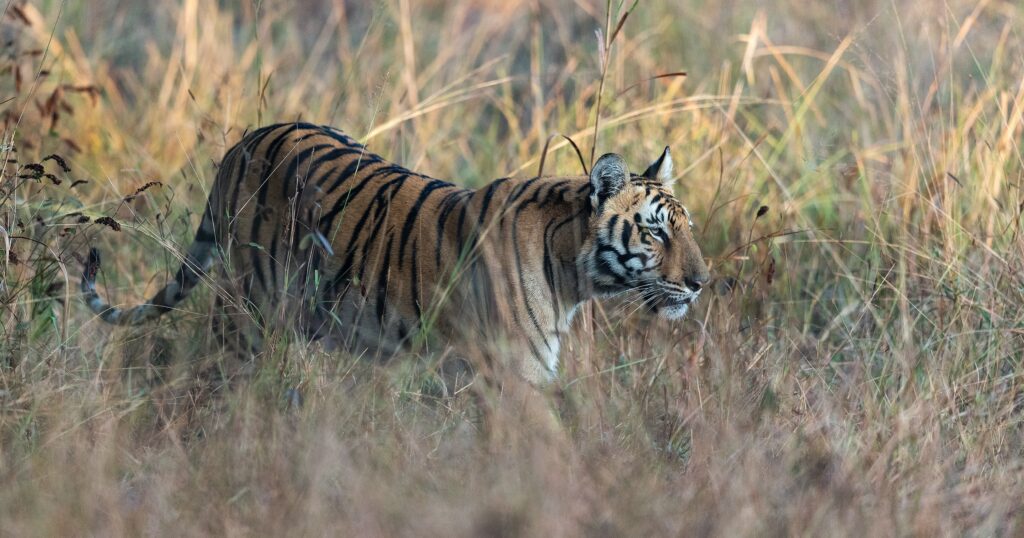
The story ‘The Tiger King’ is a satire on the pride and stubbornness of those in power. Further, the writer, Ramaswamy Krishnamurthy, takes us to the days of autocratic and eccentric kings. This article contains The Tiger King Summary Class 12 English along with questions and answers.
These kings lived under the thumb rule of British, hence they feared them. Most of the time the rulers were not interested in serving the people and working for the welfare of the public; instead they spent their time in foolish pursuits. They flouted all laws and bent them to suit their selfish interests. The tiger king theme is also explained below.

Theme of The Tiger King Class 12
Animals and birds are as much part of the nature as human beings. The destruction or haphazard killing of one species may not only lead to its extinction, but it will adversely affect the ecological balance. Those animals which serve as food for the wild animals, will increase in large number, if the beast of prey are wiped out. Each species, howsoever fierce, deadly, ferocious or poisonous has its role in maintaining ecological balance in nature.
You May Also Like : Aunt Jennifer’s Tigers Summary Class 12 English
Summary of The Tiger King Class 12
The Maharaja Sir Jilani Hung Bahadur of Pratibandapuram is mentioned in this tale. His future was foretold by astrologers when he was only 10 days old. According to astrology, a tiger will murder him. Unexpectedly, the 10-day-old prince responded, “Let tigers beware!” The boy develops in the same way as any other royal child, including drinking white cow milk, having an English nanny take care of him, and seeing English movies.
The Maharaja
He was crowned king at the age of 20 and was made aware of the death prophecy. He began killing tigers after that, and his state subsequently banned tiger hunting. The astrologers warned him to exercise caution around the 100th tiger, even if he managed to kill 99 tigers.
The 50 rings
When a high-ranking British officer once visited his state, he expressed a desire to go tiger hunting. The Maharaja, though, turned down his request. The Maharaja also provided 50 diamond rings worth Rs 3 lakh to the British officer’s wife in an effort to appease her and spare the state the anger of the officer.
The 100th tiger
The Maharaja killed 70 tigers successfully in ten years. But after that, Pratibandapuram was devoid of any tigers. He then married a girl from the royal state that had more tigers so that he could hunt more and fulfil his goal of killing 100 of them. He made sure to kill five to six tigers each time he went to see his in-laws. He managed to kill 99 tigers in this way, but he was unable to track down the final tiger. The Maharaja became aggressive and threatened the Dewan after failing to locate the hundredth tiger. The Dewan obtained an elderly tiger from the circus and, with much difficulty, placed him in the jungle to protect himself from the king’s wrath.

The tiger did not die
He informed the Maharaja of the tiger. Excited, the Maharaja set out on a hunt and killed the tiger with a shot. He had a sense of victory and joy. But he was unaware that his shot had missed, the tiger was still alive, and that his collapse had been caused purely by fright. No one had the courage to tell the Maharaja the truth, so the tiger was slaughtered and brought in a large procession instead.
The tiger that killed the Maharaja
The Maharaja was finally thrilled and content. So as a birthday present for his son, the father purchases a wooden tiger. The wooden tiger had unpolished edges and was made of wood. The Maharaja got a woodcut in his hand while playing with it, which subsequently developed into an untreatable infection and caused his death. As a result, the 100th tiger—despite being made of wood—accidentally fulfilled the astrologer’s prophecy and murdered the monarch.

Conclusion – The Tiger King Summary
The tiger king summary class 12 English along with questions and answers and summary – Through this story we understand that no person can change what destiny has for him/her and we are not in control of everything that happens in our lives. We must also never interfere with the order of nature as animals are also living things and must not be killed. Therefore, we must proceed with care and caution.
Questions and answers – The Tiger King summary Class 12
Read and find out – The Tiger King summary
Q1. Who is the Tiger King? Why does he get that name?
Ans. The Tiger King, or Maharaja of Pratibandapuram, was so named. The prince would eventually have to pass away, according to astrological predictions made at the time of his birth. The ten-day-old prince enquired of the astrologers about the circumstances surrounding his demise. The miracle puzzled the wise men. According to the leading astrologer, a tiger would kill him. The young prince barked ominous warnings, “Let tigers beware,” before growling. He made the decision to murder 100 tigers. He so earned the moniker “Tiger King.”
Q2. What did the royal infant grow up to be?
Ans. With each passing day, the crown prince Jung Jung Bahadur continued to grow taller and more powerful. He was raised by an English nanny, had an English tutor, and when he turned twenty, he was given charge of his state. Because the astrologers had predicted that he would be killed by a tiger, he made the decision to kill tigers in self-defense.
Read and find out – The Tiger King summary
Q3. What will the Maharaja do to find the required number of tigers to kill?
Ans. The Maharaja managed to kill seventy tigers in a decade. The Pratibandapuram forests eventually lost all of their tigers. Thirty tigers still needed to be taken out by the Maharaja’s gun, so he summoned the Dewan and asked him if he knew that. Fear gripped Dewan. The Maharaja informed Dewan of his decision to marry. He requested that the Dewan compile statistics on the number of tigers in each of his native states.
A royal family’s female from neighbouring state that had a lot of tigers was picked out whom he could marry. This strategy was carried out. The right female was located by the dewan in a state with a lot of tigers. Every time the Maharaja went to visit his in-laws, he killed almost five or six tigers. He was able to locate the necessary quantity of tigers to kill as a result. He murdered 99 tigers.

Read and find out – The Tiger King summary Class 12
Q4. How will the Maharaja prepare himself for the hundredth tiger which was supposed to decide his fate?
Ans. When there was only one more tiger left to be killed, the Maharaja’s excitement and worry both heightened. The thought of killing the hundredth tiger gripped him throughout the day, and at night, he dreamed about it. Even in his father-in-law’s though, the tiger farms went dry. Tigers were no longer to be found anywhere. The Maharaja would sleep peacefully if he could manage to kill just one more tiger. As advised by the late chief astrologer, the Maharaja should be on the lookout for the hundredth tiger.
Then some good news arrived. Sheep started to routinely vanish from a highland community in his own state. A tiger was undoubtedly at work. To inform the Maharaja, the peasants ran, where the Maharaja declared that village will be exempt from all taxes for three years. He immediately went on the hunt but was unable to locate the tiger. The Maharaja kept setting his camp in the woods while he awaited the tiger.
Read and find out – The Tiger King summary Class 12
Q5. What will now happen to the astrologer? Do you think the prophecy was indisputably disproved?
Ans. In order to save his skin, the dewan got an old tiger brought from the People’s Park in Madras. It was kept hidden in his house. One midnight with the help of his aged wife, he dragged the tiger to the car and shoved it into the seat. Then, he himself drove the car straight to the forest where the Maharaja was hunting. The dewan hauled the beast out of the car and pushed it down to the ground. Next day, the same old tiger wandered into the Maharaja’s presence. He took careful aim at the beast and then the tiger fell down in a crumpled heap. The Maharaja was extremely happy that he had killed the hundredth tiger.
The hunters found that the old tiger was not dead. It had only fainted on hearing the sound of the bullet. They did not want the Maharaja to know this fact and lose their jobs. Therefore, one of them shot at it and killed it. The dead tiger was taken in procession through the town and buried there. Further, a tomb was erected over it.
However, the prophecy was not disproved as the king met his death with the infection caused by the sliver of a wooden tiger. The astrologer was already dead. He could not be punished or rewarded.
Reading with insight
Q1. The story is a satire on the conceit of those in power. How does the author employ the literary device of dramatic irony in the story?
Ans. On the surface, “The Tiger King” appears to be a straightforward account of a royal prince’s development and achievements as a king. Then, by adding a sense of surprise and suspense, the prophecies made concerning his death at birth make the story intriguing. The story is also a parody on the arrogance of individuals in positions of authority on a deeper level. Those in positions of authority are frequently observed to be overly proud of who they are and what they accomplish. The British officer and the Tiger King are two examples of these characters in the narrative. To further highlight their flaws and vulnerabilities, the author also uses dramatic irony and humour. These characters’ words have additional meaning. They are unaware of what is about to happen.
To refute the astrologer’s prophecy, the Tiger King decides to hunt 100 tigers. But due to his stubbornness, a wooden tiger captures him. The senior British officer exhibits similar vainness. He is more interested in taking pictures with the carcass than in the actual hunting. The Tiger King offers to plan any hunt other than tiger hunting. It could involve hunting for boars, mice, or mosquitoes. He also lost three lakh rupees as a result of his denial. When the British officer’s wife is happy to receive diamond rings supplied by the Maharaja, his ego is fulfilled.

Reading with insight
Q2. What is the author’s indirect comment on subjecting innocent animals to the willfulness of human beings?(Alternatively : What is the theme of the story The Tiger King?)
Ans. Innocent creatures have been subjugated to human wilfulness for generations. Animals have been killed by man for sport, food, and body parts. In the story, the author doesn’t directly address it. Man frequently uses weird logic to support even his immoral and terrible deeds. According to an old proverb, “You may slaughter even a cow in self-defense,” the Maharaja said. Therefore, he sees nothing wrong with killing tigers for self-defense. It demonstrates not just how indifferent humans are to wildlife but also how little concern they have for preserving the natural equilibrium. The extinction of the tiger species in the state of Pratibandapuram and the state ruled by the Maharaja’s father-in-law is a poignant example of what happens when people treat wild creatures cruelly. An old tiger had to brought in just to appease the wish of Maharaja to kill 100 tigers.
Reading with insight
Q3. How would you describe the behaviour of the Maharaja’s minions towards him? Do you find them truly sincere towards him or are they driven by fear when they obey him? Do we find a similarity in today’s political order?
Ans. A minion is a low-level employee who must follow directions in a company. The Maharaja has numerous aides or valets. The majority of them fear the Maharaja and diligently carry out his commands. They cannot challenge him or disobey him. If the Maharaja is not pleased, you risk losing your job or possibly your life. Only a few of them have his best interests at heart. The chief astrologer is one such individual. If his prediction turns out to be incorrect, he is prepared to burn his astrology books, remove his tuft, and cut his hair short. The Maharaja is kept amused by the others. No one is exempt, not even the dewan.
The Maharaja’s rage and obstinacy grow as more officials are fired. The hundredth tiger is not struck by the king’s bullet. It collapses in a tattered heap after fainting from shock. Although the hunters are aware of the reality, they choose not to tell the king. They worry about maybe losing their employment. In the political system of today, employees serve their superiors as dumb, deaf creatures who only perceive what their employers want them to. They are loyal servants because of their self-interest and dread of being eliminated.
Reading with insight
Q4. Gan you relate instances of game-hunting among the rich and the powerful in the present times that illustrate the callousness of human beings towards wildlife?
Ans. Since many wildlife species have been listed as endangered, large game hunting is now prohibited by law. To prevent the extinction of species and preserve the ecological balance of the natural world, sanctuaries, national parks, and game reserves have been established. Even yet, isolated instances of game-hunting occasionally make the news. It is frequently observed that former rulers—kings, nawabs, wealthy and powerful individuals, or well-known movie stars—engage in game hunting. Salman Khan and the late M.A.K. Pataudi both have lawsuits pending in court. Poachers and smugglers also kill wildlife for its skin, meat, or various organs while getting away with it.
Reading with insight
Q5. We need a new system for the age of ecology—a system which is embedded in the care of all people and also in the care of the Earth and all life upon it. Discuss.
Ans. The modern era is the ecological era. Humans now possess a different level of consciousness. Birds and animals are as much a part of nature as people are. One species’ destruction or indiscriminate killing could cause it to go extinct, as well as have a negative impact on the ecological balance. If the predatory animals are eliminated, the number of creatures that the wild animals eat will rise dramatically. Every species, no matter how vicious, lethal, ferocious, or poisonous, has a certain function in the overall scheme of things. A new system needs to be created. It must put equal emphasis on taking care of the Earth and every living thing—be they plant or animal—that inhabits it.
Conclusion: The Tiger King Class 12 summary
The central theme revolves around human greed and our incessant use of nature. This highlights the need for us to consider our needs and wants, so as to sustain all life forms. In this article, the Tiger King summary Class 12 is provided along with questions and answers for students to grasp the important facts and ace thrir exams.